
Deli Cases and Bakery Display Cases Buying Guide
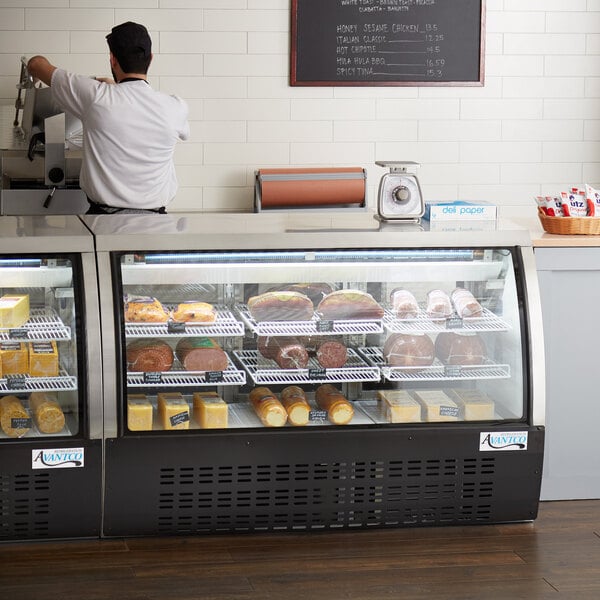
What Is a Deli Case?
A deli case maintains low temperatures to keep meats, cheeses, pasta salads, and other deli items chilled and at safe serving temps. They can also be used at convenience stores to merchandise bottled drinks, sushi, yogurt parfaits, pre-made salads, wraps, sandwiches, and grab-and-go snacks.
Deli cases have three service types: full service, open-air self service, and self service. Full service cases only provide rear access so that employees can serve customers from behind the counter. Open-air self service cases make it easy for customers to browse your selection of packaged deli or bakery items and are perfect for convenience stores, markets, and grocery stores. Self-service cases feature a lift-up front glass pane that allows customers to view the product without obstruction and serve themselves.
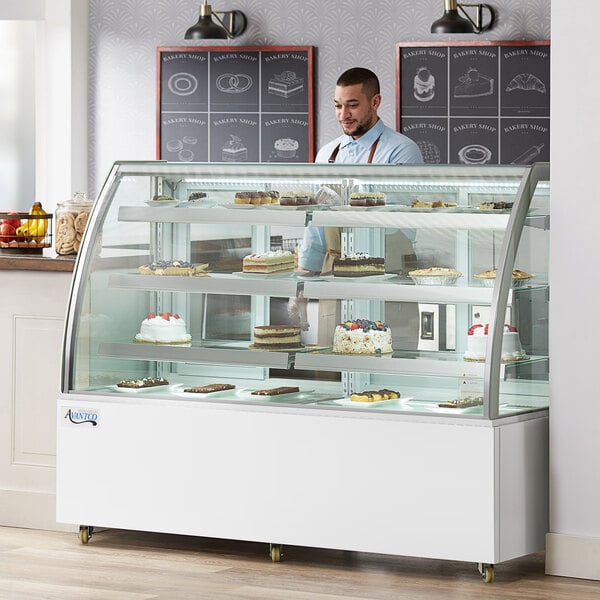
What Is a Bakery Case?
A bakery display case is an essential piece of bakery equipment that increases the visibility of your cakes, pies, pastries, and other goods. Great for bakeries, cafes, and diners, it protects your goods from airborne contaminants while allowing complete visibility to help boost impulse sales.
Bakery cases come in either dry or refrigerated models depending on the items you are serving. There are also three service types to choose from: dual service, full service, and self service. Dual service cases allow for front and rear access to simultaneously merchandise to-go items and your protected treats, while full service cases only provide rear access so that employees can serve customers from behind the counter. Self service cases provide easy access to customers and are great for hotels and cafeterias.
Display Case Refrigeration Types
Refrigerated display cases like these use two basic types of refrigeration: forced air or gravity coil. The best type for you depends on the items you want to display in the case.
Forced Air
As their name implies, forced air systems rely on fans to circulate cold air throughout the cabinet to keep food contents cool. These cabinets are most often used for bakery products, prepackaged products, and some deli applications. It's important to note that because of this air movement, the products you are displaying can dry out if they aren't covered or are left in the case for too long.
Items on our website that use this method are mainly called "Refrigerated Bakery Display Cases" or a similar variation of that.
Gravity Coil
Gravity coil systems boast a refrigeration coil at the top of the cabinet that allows the cool air to "drop" down over the food. These types of display cases are best for raw meat, seafood, salads, and other deli products where you don't want the drying effect of constantly circulating air. Gravity coil cases tend to be less expensive than forced air cases.
Items on our website that use this method are mainly called "Refrigerated Deli Cases" or a similar variation of that.
What Do I Want to Display In the Food Case?
This chart provides a simplified breakdown of which menu items are best for each refrigeration type to help you choose the best display case for your business!
Food Item | Forced Air | Gravity Coil |
|---|---|---|
Pie | ||
Cake | ||
Danishes and other Pastries | ||
Seafood | ||
Raw Meat | ||
Pasta Salad | ||
Cheese | ||
Coleslaw | ||
Salad | ||
Deli Meat |
Display Case Purchasing Considerations
Once you've decided which type of display case is right for you, you will want to narrow down your choices by considering the features and options of each case.
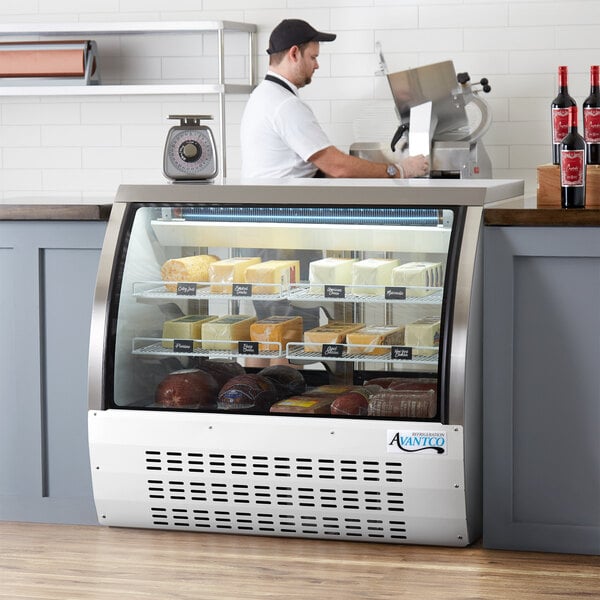
Size:
Don't think of size just in terms of how much floor space you have for a case. You might have room for a large case, but if the majority of products you want to display have a short shelf life and/or a quick turnaround time, you can often use a smaller case and save space, energy, and money!
Some manufacturers offer "low profile" versions of their cases, which bring all the features and benefits of the larger size in a compact design, which is ideal for convenience stores and other places where space is a concern.
Be sure to carefully view the specification sheet of the case to make sure you can meet the clearance requirements for intake and exhaust air. Since many of these cases are also quite large, you also want to look at the measurements carefully to make sure the case will fit through your doorway.
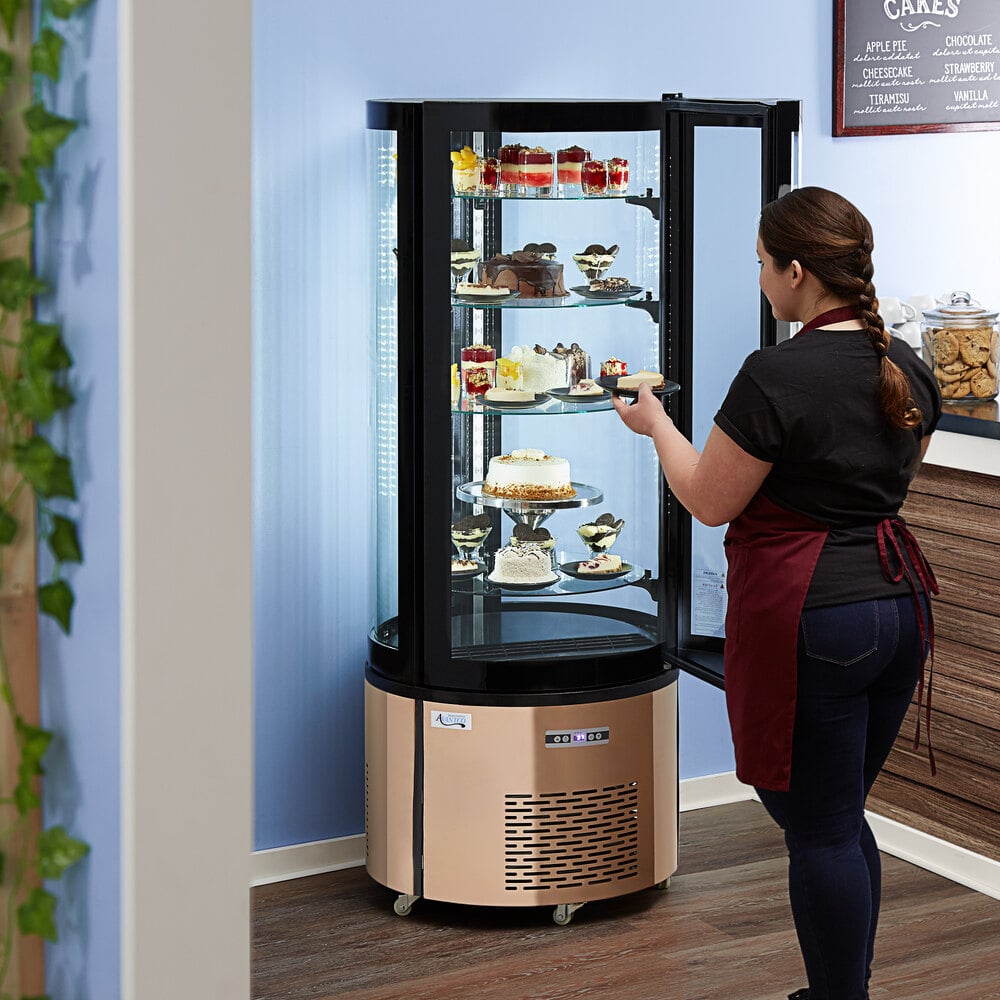
Shelving
Helps maximize the visibility of all the products in the case
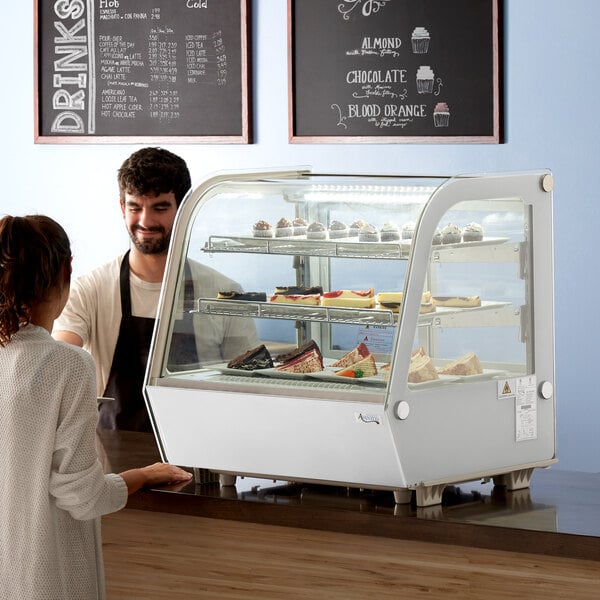
Style
Come in either straight glass or curved glass models
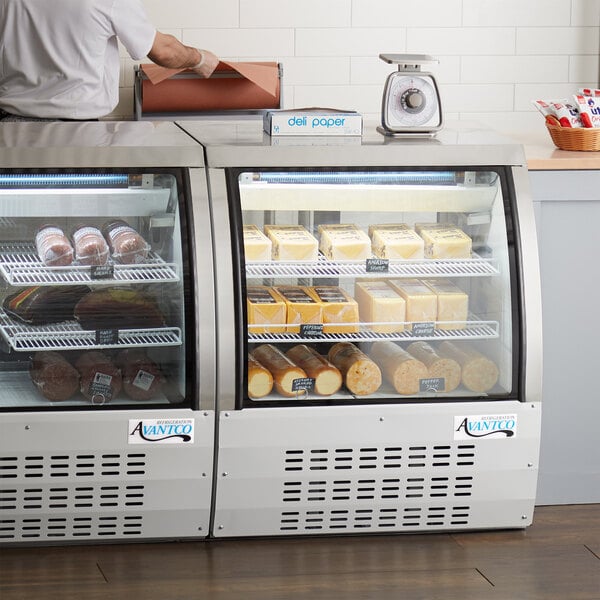
Lighting
Lighted interiors help make your products look their best
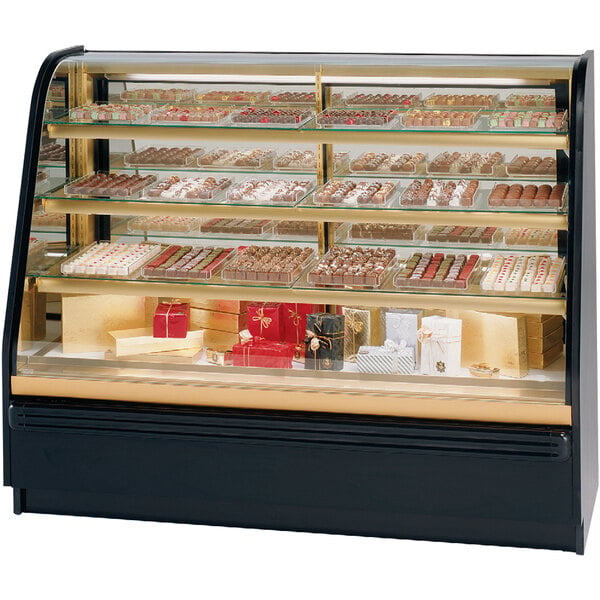
End Panels
Make your case appear full and bigger
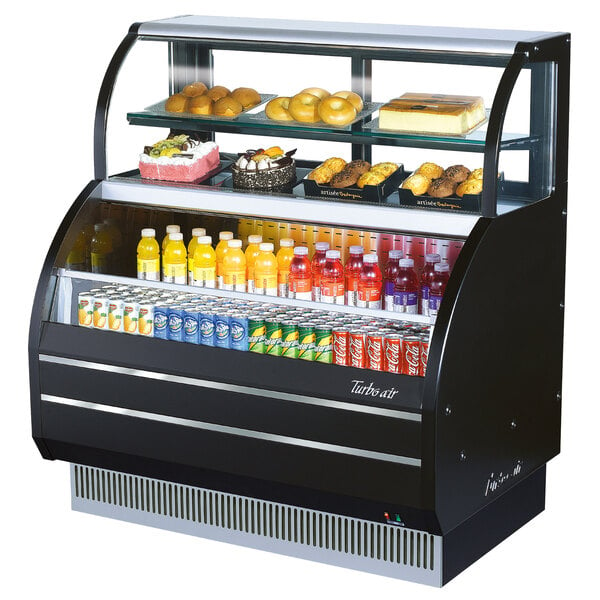
Colors
Typically come in either black, white, or silver
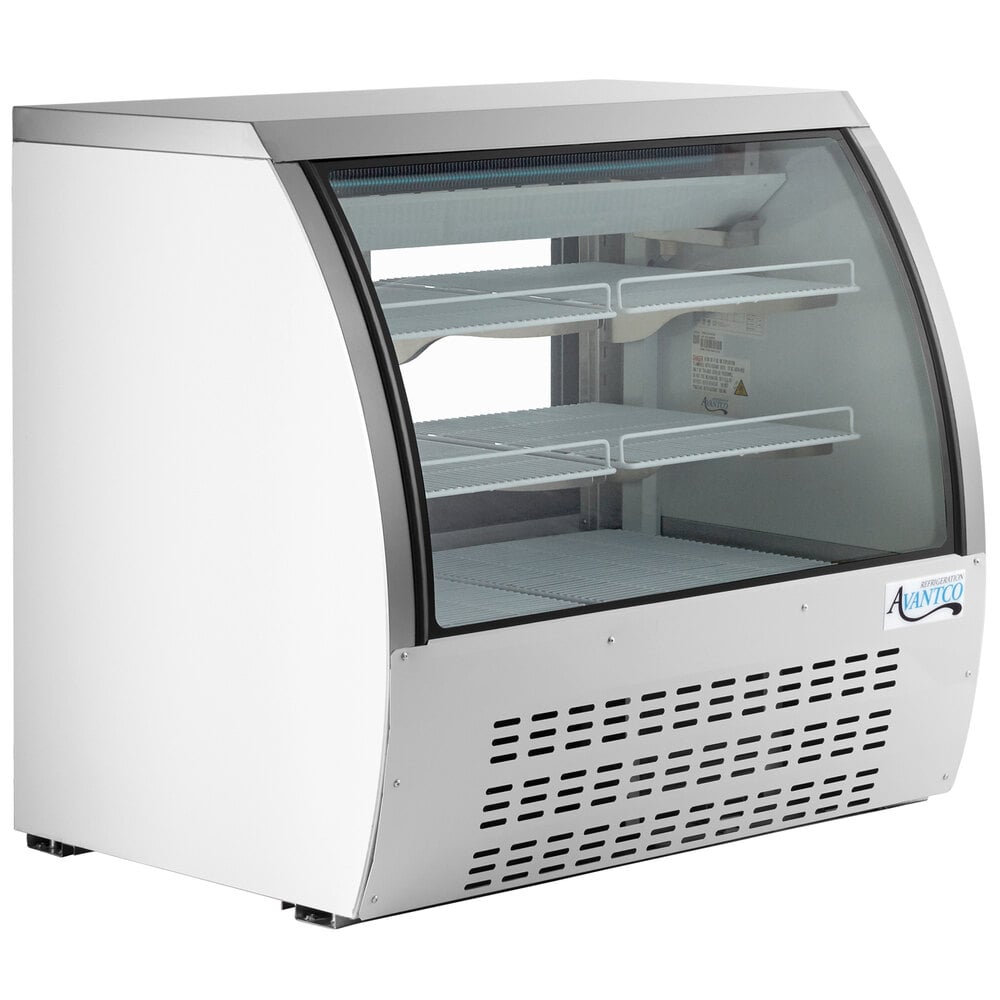
Curved Glass
Some models have front glass that tilt up or out for easy cleaning
Related Resources

September 2024 WebstaurantStore Coupon Code
Fall is almost here, and to celebrate Webstaurantstore is offering a selection of amazing deals! In September, you'll discover incredible prices on classic fall flavors, glassware, cold cups, and much more! Take a look at our selection of sale items below and don't forget to enter the code COZY24 at checkout to enjoy savings of up to 25%! We're also excited to introduce the new Webstaurant Rewards® Visa Business Card ! Sign up for a new card today and start earning rewards on every WebstaurantStore purchase. Discover the latest discounts on consumable food and beverage items with September's monthly coupon code. From ready-to-bake pastries to classic fall flavoring mixes, you can find great deals on essential consumables for your commercial
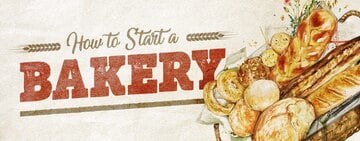
How to Start a Bakery
Whether you dream of opening a donut shop or a boulangerie, starting a bakery allows you to serve niche markets and express culinary creativity without taking on the financial burden of opening a restaurant. You can even start your bakery business from home before investing in a commercial space. While bakeries are comparatively accessible foodservice businesses, they present unique challenges. From writing a bakery business plan to getting funding and filing for permits, we walk you through each step of opening a bakery. Shop All Bakery Supplies Jump to a specific step of opening a bakery: Choose Your Bakery Style Write a Bakery Business Plan Get Startup Loans Lease a Bakery Location Bakery Permits and Licenses Order Bakery Equipment Desig
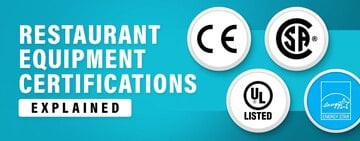
Restaurant Equipment Certification Marks Explained
In the foodservice industry, sanitation and safety are extremely important. To keep equipment operators and end consumers safe, several certifying and testing agencies exist to work with manufacturers and verify that the restaurant equipment and smallwares they produce meet specific requirements. You can recognize products that meet these requirements by certain symbols found on the equipment or in its specification sheet. We will discuss some of the most common third-party testing agencies and directives, their importance, and how they may affect your business.
- Topics 1408
- Industrial 55
- Troubleshooting Guides 23
- Restaurant Management 130
- Bar Management 59
- Catering Tips 38
- Bakery Management 43
- Food Trucks & Concessions 50
- Advertising & Marketing 37
- Eco-Friendly Tips 11
- Facility Layout & Design 44
- Coffee Shop Tips 30
- Installation & Maintenance 56
- Janitorial & Pest Control 30
- Safety & Sanitation 95
- Startup Tips 104
- Menu Design 10
- Kitchen & Cooking Tips 85
- Hospitality Management 24
- Pizza & Sandwich Shop Tips 37
- Smallwares 37
- Food Prep 98
- Tabletop Items 18
- Disposables 23
- Calculators & Tools 6
- Consumables 53
- Warewashing & Laundry 18
- Cooking Equipment 98
- Food Storage & Refrigeration 52
- Beverage Equipment 38
- Office Supplies 6


